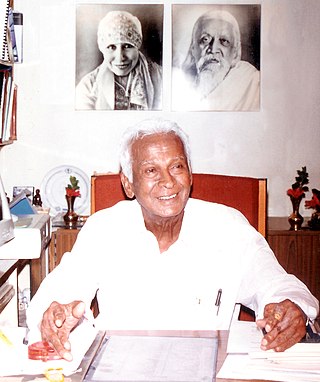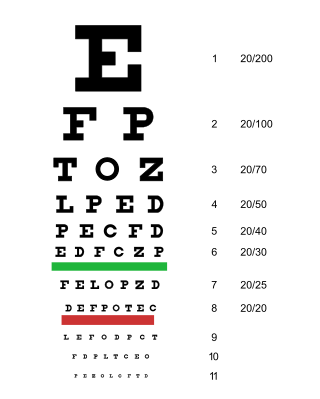Related Research Articles

The International Association of Lions Clubs, more commonly known as Lions Clubs International, is an international service organization established in 1917 in Chicago, Illinois, by Melvin Jones. The organization is currently headquartered in Keller, Texas. As of January 2020, it had over 46,000 local clubs and more than 1.4 million members in more than 200 countries and geographic areas around the world.
The Royal National Institute of Blind People (RNIB) is a UK charity offering information, support and advice to almost two million people in the UK with sight loss.
Visual impairment, also known as vision impairment, is a medical definition primarily measured based on an individual's better eye visual acuity; in the absence of treatment such as corrective eyewear, assistive devices, and medical treatment– visual impairment may cause the individual difficulties with normal daily tasks including reading and walking. Low vision is a functional definition of visual impairment that is chronic, uncorrectable with treatment or conventional corrective lenses, and impacts daily living. As such low vision can be used as a disability metric and varies based on an individual's experience, environmental demands, accommodations, and access to services. The American Academy of Ophthalmology defines visual impairment as the best-corrected visual acuity of less than 20/40 in the better eye, and the World Health Organization defines it as a presenting acuity of less than 6/12 in the better eye. The term blindness is used for complete or nearly complete vision loss. In addition to the various permanent conditions, fleeting temporary vision impairment, amaurosis fugax, may occur, and may indicate serious medical problems. The abbreviation VIP is sometimes used for Visually Impaired Person, Persons or People.

Orbis International is an international non-profit non-governmental organization (NGO) dedicated to saving sight worldwide. Its programs focus on the prevention of blindness and the treatment of blinding eye diseases in developing countries through hands-on training, public health education, advocacy and local partnerships. Since 1982, Orbis capacity-building programs have enhanced the skills of 325,000 eye care personnel and provided medical and optical treatment to more than 23.3 million people in 92 countries.
Women's History Month is an annual declared month that highlights the contributions of women to events in history and contemporary society. It is celebrated during March in the United States, the United Kingdom, and Australia, corresponding with International Women's Day on March 8, and during October in Canada, corresponding with the celebration of Persons Day on October 18.

Govindappa Venkataswamy, popularly known as Dr V., was an Indian ophthalmologist who dedicated his life to eliminate needless blindness. He was the founder and former chairman of Aravind Eye Hospitals. He is best known for developing a high quality, high volume, low-cost service delivery model that has restored sight to millions of people. Since inception, Aravind Eye Care System has seen over 55 million patients, and performed over 6.8 million surgeries. Over 50% of the organisation's patients pay either nothing or highly subsidised rates. Its scale and self-sustainability prompted a 1993 Harvard Business Case Study on the Aravind model.

Blindness is a 2008 English-language thriller film about a society that suffers an epidemic of blindness. The film is an adaptation of the 1995 novel of the same name by the Portuguese author José Saramago. The film was written by Don McKellar and directed by Fernando Meirelles, starring Julianne Moore as the doctor's wife and Mark Ruffalo as the doctor. Saramago originally refused to sell the rights for a film adaptation, but the producers were able to acquire it with the condition that the film would be set in an unnamed and unrecognizable city. Blindness premiered as the opening film at the Cannes Film Festival on May 14, 2008, and was released in Canada as part of the Toronto International Film Festival on September 6, 2008.
Abdulaziz bin Ahmed Al Saud is a Saudi royal and businessman.
Seeing is Believing (SiB) is a global initiative to tackle avoidable blindness. SiB is a partnership between Standard Chartered Bank PLC and the International Agency for the Prevention of Blindness (IAPB).
The International Council of Ophthalmology (ICO) is an international organisation that represents professional associations of ophthalmologists. It is headquartered in Brussels.

Sanduk Ruit is an ophthalmologist from Nepal who has restored the sight of over 180,000 people across Africa and Asia using small-incision cataract surgery.

B2 is a medical based Paralympic classification for blind sport. Competitors in this classification have vision that falls between the B1 and B3 classes. The International Blind Sports Federation (IBSA) defines this classification as "visual acuity ranging from LogMAR 1.50 to 2.60 (inclusive) and/or visual field constricted to a diameter of less than 10 degrees." It is used by a number of blind sports including para-alpine skiing, para-Nordic skiing, blind cricket, blind golf, five-a-side football, goalball and judo. Some sports, including adaptive rowing, athletics and swimming, have equivalents to this class.

Disability golf classification is used for deaf golf, blind golf, amputee golf, golf for mentally disabled people, paraplegic golf and other forms of golf involving people with disabilities.

The Organisation for the Prevention of Blindness is an international non-governmental organisation whose actions today focus exclusively on French-speaking countries in Africa. Their mission is to preserve and restore sight amongst some of the most under-privileged communities in the region. The OPC's principal actions concern blindness prevention, treatment and the elimination of blinding diseases, such as onchocerciasis, trachoma, glaucoma and cataracts as well as formal ophthalmological training.
The Brien Holden Vision Institute (BHVI) is an Australian nonprofit non-governmental organization with an international focus on eye care research and vision care delivery. Formerly the Institute for Eye Research, in 2010, it was renamed in recognition of co-founder and optometrist Professor Brien Holden OAM, a 1997 recipient of the Medal of the Order of Australia for his contributions to eye care research.

Childhood blindness is an important contribution to the national prevalence of the disability of blindness. Blindness in children can be defined as a visual acuity of <3/60 in the eye with better vision of a child under 16 years of age. This generally means that the child cannot see an object 10 feet away, that another child could see if it was 200 feet away.
Niranjan Pranshankar Pandya is an Indian blind social worker and the secretary of Poona Blind Mens' Association, a non governmental organization working for the cause of visually impaired people of Pune and neighbouring areas. He was honored by the Government of India, in 2012, with the fourth highest Indian civilian award of Padma Shri.
Gullapalli Nageswara Rao is an Indian ophthalmologist, the chairman of the Academia Ophthalmologica Internationalis (AOI) and the founder of the L. V. Prasad Eye Institute, Hyderabad. A former associate professor at the School of Medicine and Dentistry of the University of Rochester, Rao is a Fellow of the National Academy of Medical Sciences, India. He was honored by the Government of India, in 2002, with the fourth highest Indian civilian award of Padma Shri. He was elected in 2017 to the Ophthalmology Hall of Fame instituted by the American Society of Cataract and Refractive Surgery.
Clare Gilbert is a British ophthalmologist, professor and researcher who focuses on blindness in children. She is based at the London School of Hygiene and Tropical Medicine (LSHTM).

The International Agency for the Prevention of Blindness (IAPB) is a global alliance of eye health organisations working for the prevention of blindness and vision impairment. IAPB was established in 1975 to work as an umbrella body for global blindness prevention activities. In 1999, IAPB and the World Health Organization launched Vision 2020: The Right to Sight, a global initiative to eliminate avoidable blindness, which has achieved some success, though it did not meet all its goals.
References
- ↑ "IAPB Website, September 2014". Archived from the original on 2017-02-10. Retrieved 2014-09-30.
- ↑ "World Sight Day".
- ↑ "World Sight Day Themes". Archived from the original on 2016-11-19. Retrieved 2014-09-30.